How hard is the SQE?
The Solicitors Qualifying Examination (SQE) is the gateway to becoming a solicitor in England and Wales. But how challenging is it, really?
The SQE is now the primary pathway to qualifying as a solicitor so if you’re wondering whether you’re ready to take it on, this guide will break down the difficulty level, common concerns, and how the right preparation can set you up for success.
Jump to
SQE: A new way of testing aspiring solicitors' skills
The SQE is designed to rigorously assess practical legal skills and knowledge through two separate assessments: SQE1 and SQE2. SQE1 tests functional legal knowledge with multiple-choice questions (MCQs), while SQE2 evaluates practical legal skills such as advocacy, drafting, and legal research.
This shift means candidates must develop a deep understanding of legal principles and apply them in real-world scenarios, making it a true test of competence. While some find the MCQ format in SQE1 deceptive - appearing straightforward but requiring precise legal application - others struggle with the practical nature of SQE2, where performance under timed conditions is key.
Additionally, the SQE allows for greater flexibility in preparation, as candidates can choose between different study routes. The right approach depends on individual learning styles, prior legal knowledge, and available study time. This flexibility also extends to when you take the assessments, as there are multiple SQE sittings each year, allowing you to choose dates that best suit your schedule and readiness.

The SQE average pass rate explained
Pass rates for the SQE vary, with SQE1 historically seeing lower success rates than SQE2. Recent data suggests that only about 50% - 60% of candidates pass SQE1 on their first attempt, while SQE2 has a higher pass rate of around 70% - 80%.
At BPP, our SQE pass rates are consistently and significantly above the national pass rate; at least 20% across the range of SQE1 and SQE2 sittings.

Why is SQE1 more challenging?
SQE1 requires mastering an extensive syllabus, with questions designed to test subtle legal nuances. Many candidates underestimate the challenge of MCQs, where multiple answers may seem correct, but only one is the most legally accurate.
The exam format also requires candidates to manage their time efficiently. Given that there are 180 questions per sitting, candidates must balance speed with accuracy, ensuring they don’t linger too long on any single question.
Why is SQE2 pass rate higher?
In contrast, SQE2 assesses practical lawyering skills, which tend to improve with experience and focused training. Those with prior legal work experience or preparation through a structured course, such as the LLM SQE 1 and 2, often perform better. SQE2 candidates are also assessed through practical legal tasks rather than MCQs, which many find easier to navigate with the right preparation.
Does the SQE make it easier to become a lawyer?
While the SQE removes some barriers to entry - such as the need for a specific degree route - it is by no means an easy alternative to the LPC. In fact, many argue that it’s tougher in key aspects:
A broader curriculum: The SQE tests a wider range of legal topics, requiring comprehensive preparation.
Higher exam pressure: Unlike the modular approach of the LPC, the SQE assesses all knowledge in one sitting.
Practical competency focus: SQE2 demands real-life legal application, making practical skills as important as academic knowledge.
However, the SQE does offer more flexibility. Candidates can prepare at their own pace and gain Qualifying Work Experience (QWE) alongside studying, making the transition into practice smoother.
Additionally, the SQE can remove the financial burden of committing to a full-time course upfront. Many students appreciate the ability to work while studying, reducing overall costs.

Passing is all in the preparation
Success in the SQE hinges on strategic preparation. Given its breadth and depth, a well-structured study plan is crucial. Here’s how to set yourself up for success:
1. Choose the right study path
While self-study is possible, BPP’s range of structured preparation courses provide comprehensive guidance, resources and practice materials that align with the exam format. Many candidates find that structured courses provide essential direction and keep them accountable in their studies. The right course can also adapt to your individual learning style and needs, ensuring you get the most out of your preparation.2. Understand the exam format
SQE1’s Multiple Choice Questions (MCQs) require precision and speed. Regular practice under timed conditions can help improve accuracy. Meanwhile, SQE2 demands practical, hands-on training, making mock assessments and feedback essential. Familiarising yourself with the format and style of the questions will help you feel more confident and prepared on exam day.3. Develop a study schedule
With a vast syllabus, consistency is key. A structured timeline—balancing core subject review, practice questions, and revision—can make a huge difference. A well-planned schedule also helps to manage stress and avoid burnout, ensuring you're in peak condition for the exams.4. Gain practical experience
Engaging in QWE through paralegal work or legal internships can provide a real-world perspective, reinforcing both SQE1 and SQE2 knowledge. Practical experience can also help you develop the key skills that are assessed in SQE2, such as legal research, drafting, and advocacy.Expectations vs. reality
Many candidates enter the SQE with misconceptions. Let’s clear a few up:

Final words of advice for SQE hopefuls
The SQE is undoubtedly a challenging journey, but it's also an exciting opportunity to demonstrate your legal knowledge and skills. Remember that success in the SQE requires more than just memorising legal principles; it demands a deep understanding of the law and the ability to apply it effectively in practical scenarios.
Don't underestimate the importance of time management and exam strategy. The SQE exams are time-pressured, so it's essential to practice answering questions quickly and accurately. Develop a study plan that allows you to cover all the necessary material and gives you ample time for practice and revision.
Finally, stay motivated and focused throughout your SQE preparation. Remember why you chose to pursue a legal career and keep that goal in mind as you navigate the challenges of the SQE.
With dedication, hard work, and the right support, you can achieve your dream of becoming a solicitor.
Ready to take the next step?
Start your journey today and set yourself up for a successful legal career!
The SQE is a demanding but achievable qualification with the right mindset and preparation.

Frequently Asked Questions (FAQs)
The SQE exams are challenging due to their extensive syllabus and focus on practical skills. The difficulty comes from the need to have both a deep understanding of legal principles and the ability to apply those principles effectively in real-world scenarios. Thorough preparation and practice are essential for success.







